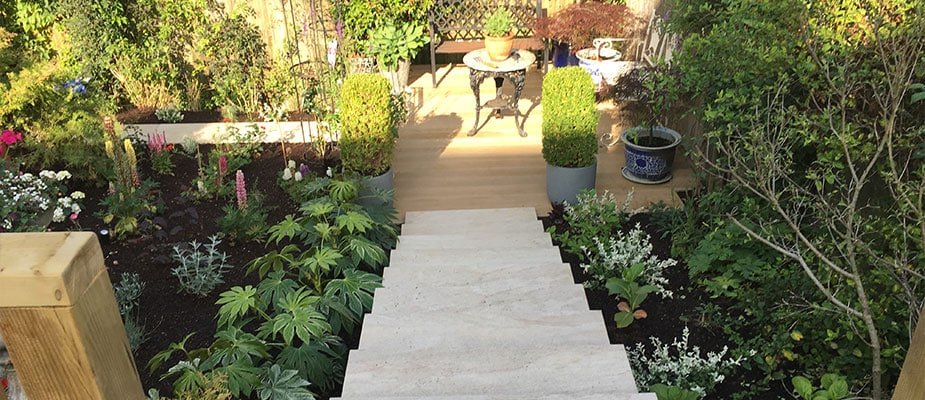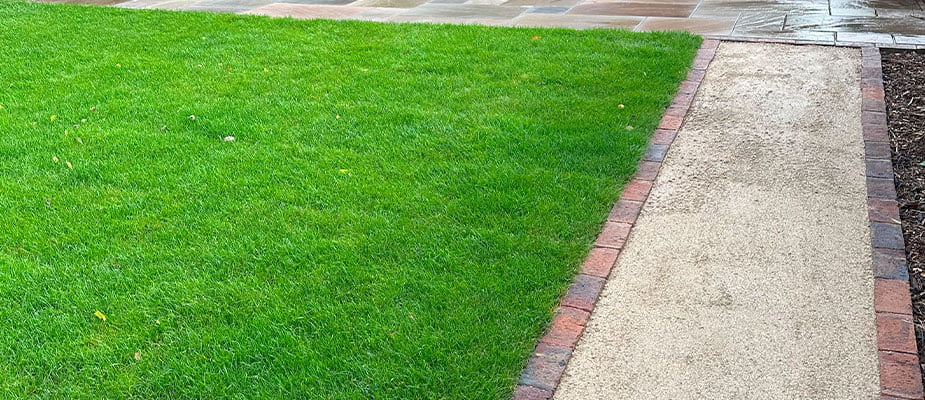With the longer days and warmer temperatures, summer provides ample opportunities to be outdoors and enjoy the wonders of nature. All of your previous hard work throughout the year pays off during the summer, as this is the peak time to enjoy your own landscape.
However, to ensure that your hard work continues to pay off, work is still required during the summer. Although this is the season for revelling in the great outdoors, this does not mean you can neglect to upkeep your landscape. There are specific gardening jobs that you will need to begin or continue during this season to ensure the health and aesthetic appeal of your landscape.
With over four decades of experience in landscaping, our team at Surrey Landscapers understands the importance of gardening in the summer. We have helped many clients over the years improve their outdoor spaces and offer ongoing support to keep these environments thriving all year long.
If you desire a thriving, healthy garden and a delightful summer spent outdoors, then you will want to consider these essential summer gardening tips.
Summer is not just the season of sunbathing and fun outdoor activities – it’s also a pivotal period for lgardeners. This season, with its longer days and warmer temperatures, is the ideal environment for plants and flowers to thrive, making it an important period on the gardening calendar.
With this new life, comes new responsibilities and you need to add more to your garden maintenance routine to keep up. Our essential summer gardening tips mainly focus on caring for and maintaining your existing landscape to support the plant life across your garden.
By caring for the plant life across your garden, you not only ensure a beautiful blooming summer but also lasting health for the next season.
Summer is the perfect time to engage in garden maintenance for the lasting appeal of your landscape. In this season of vibrancy and bloom, getting your hands dirty can be a rewarding experience.
These summer gardening tips aim to optimise your current garden while preserving its health for a more lustrous future.
One of the key summer gardening tips is to hydrate your plants properly. Ensuring your garden gets sufficient water during summer is vital as the higher temperatures and longer days can dry out the soil and prevent the plants from getting the necessary nutrients.
While you may be tempted to simply increase the amount of watering you do across your landscape, it is important to remember that overwatering is just as damaging as underwatering. This is why establishing a regular watering routine is so important, as it can you to adequately maintain your plants without drowning them.
During summer, it is a good idea to water your garden either early in the morning or late in the evening. This minimises evaporation, allowing you to provide an even watering so the roots can receive adequate moisture.
Although it is generally advised to avoid overwatering, there are some occasions when deep watering may be the best option. For some plants, deep watering once or twice a week is better than a regular watering routine.
During the summer, deep watering occasionally can also be beneficial if you are planning on spending time away from your landscape as it ensures the roots are getting the moisture they need. All living organisms require water to survive, including plants, flowers, and foliage.
All plant life across your landscape will need more watering during the summer, even your lawn. Our summer gardening tips include regular watering of lawns, which can be easily done using a sprinkler system.
You can set a timer for your sprinklers to ensure your lawn is being watered regularly, keeping it green and lush.
Another great summer gardening tip is to use deep irrigation systems for vegetable gardens and flower beds as they will deliver water directly to the base of your plants, to reduce waste and keep the foliage dry.
Mid-summer is an ideal time to tidy your garden by deadheading spent flowers and trimming overgrown plants.
Deadheading not only keeps your garden tidy but also encourages plants to yield more flowers which is why it is one of the most essential summer gardening tips. It can offer instant benefits, while also preserving the health of your garden for next season.
Some plants require more pruning than others, for example, perennials such as roses, geraniums, and dahlias should be regularly pruned to prolong their blooming period. Regular pruning of these plants will keep your garden vibrant throughout the season.
When pruning, trim back any dead or diseased branches and thin out dense foliage. This will give your plants an attractive, neat appearance as well as improve air circulation. With better air circulation, you can reduce the risk of fungal diseases across plant life.
Summer-flowering shrubs like hydrangeas and buddleias will benefit from light pruning during this season to encourage new growth and more plentiful blooms.
Feeding your plants with the necessary nutrients keeps your garden in excellent condition. This is an ongoing gardening job that you should do throughout the year, but it also ranks as one of the most important summer gardening tips as most plants are in full bloom during this season.
A balanced, slow-release fertiliser provides a constant supply of nutrients over several weeks and is highly beneficial in supporting the growth of all kinds of plants and flowers. You can use synthetic fertilisers or organic options like compost or well-rotted manure for this.
The frequency of feeding your plants will vary based on the type of plants you’re dealing with and their location in your landscape. For example, container plants and hanging baskets may require more frequent feeding during the summer as nutrients can drain out of the soil quickly.
For these kinds of plants, liquid fertiliser can be applied every fortnight to keep them healthy and vibrant, ensuring a colourful garden throughout the summer.

Essential summer gardening tips often include pest and disease management because of how big a threat these can be during this season. Pests and diseases will impact the health of your plants and can even cause fatalities if left unattended.
As plants grow, they attract more pests and diseases. During the summer, watch out for common pests like aphids, slugs, and caterpillars, and act promptly at the first sign of damage to maintain the health of your plants as the season progresses.
There are several options to combat pests and diseases, based on your preferences and your garden’s needs. Natural remedies like neem oil or soapy water can control pests without harming beneficial insects in your garden.
During the summer, you also need to remain vigilant and look for signs of fungal diseases which can ruin your landscape. Symptoms such as powdery mildew and black spots on certain plants are more likely to appear during the summer and could be detrimental without the correct care.
To inhibit the spread of these diseases, ensure your plants have good air circulation and develop a smart watering routine to avoid overwatering.
Fungicides can be used to treat affected plants and prevent the spread of disease, or you can engage professional landscape gardeners to help remove the infection from your garden.
One of the most significant summer gardening tips revolves around weeding, as all plants, including weeds, experience growth during this season.
Weeds, if unchecked, can take over your garden, and will compete with the plant life you do want for water and nutrients. Weeds can be an eyesore and ruin your garden design, but as they can also bring a higher risk of infection and fatality to your plants they need to be handled promptly.
Regular weeding is crucial to maintaining the health and aesthetic appeal of your garden throughout the summer season. Weeds can be pulled out by hand or removed with a hoe, depending on their type and location.
When removing weeds, do not excessively disturb the soil as this could adversely affect the plants you want to nurture.
Once the weeds have been removed, you can apply a layer of mulch around your plants. Mulch can deter weed growth and help retain soil moisture to support the right kind of growth.
A lush, green lawn is a garden’s pride, and during the summer extra attention is required to keep this going. This is why regular mowing and watering are some of the most important summer gardening tips we can offer.

It is advised to mow your lawn frequently during the summer, as this period of growth means it can quickly become unruly and impact your garden design. Although regular mowing is required, you also need to avoid cutting the grass too short as this can have a detrimental effect on the health of your garden.
Cutting the grass too short can stress the lawn and leave it vulnerable to drought. Aim to maintain a lawn height of about 2.5 to 3.5 cm when cutting during the supper.
Additional summer gardening tips for your lawn include aerating for improved water penetration and reduced soil compaction to promote healthy root growth.
If your lawn shows signs of wear, consider overseeding with grass seed to fill in barren patches. Applying a summer-specific lawn fertiliser will keep your lawn green and healthy as the season progresses and is a way to ensure it will remain healthy no matter what.
Tall or top-heavy plants might require extra support during summer to prevent them from collapsing under their own weight.
As these plants grow taller and wider, they can struggle to support themselves and need additional help. For such plants, our summer gardening tips recommend using stakes, cages, or trellises for extra support.
Tying plants to these supports with soft twine or plant ties will help maintain their upright position even as they grow and minimise damage.
Plants like tomatoes, beans, and sunflowers can also benefit from these summer gardening tips and may need additional support as the season progresses due to their height and weight.
Summer is the season of abundance for many plants and can be an excellent opportunity for healthy harvesting.
If you grow fruits and vegetables in your garden, summer is a great time to begin harvesting as it can encourage ongoing production. Summer is also the season you will experience the freshest produce and should not be missed.
Regular picking of beans, peas, tomatoes, and cucumbers during the summer benefits both your landscape and you.
Fruits such as strawberries, raspberries, and cherries are also at their best during the summer and should be harvested. Harvesting these fruits at their peak ripeness during the summer guarantees the best taste and reduces the risk of attracting pests.
At Surrey Landscapers, we understand that keeping a beautiful garden can be demanding, particularly during the active summer months.
Our team of expert gardeners is here to assist you with all your summer gardening needs, from watering and pruning to pest control and lawn care. We provide a range of services to help support your landscape in all seasons, from garden design to paving and driveway installation.
With our commitment to superior workmanship and customer satisfaction, we are equipped to help you design and maintain a garden that you will be proud of all year long.
If you’re ready to make the most of your garden this summer, contact us today.
We can provide a range of landscaping and maintenance services to support your garden all year round, as well as design new landscapes to suit your lifestyle